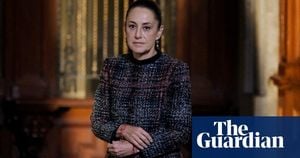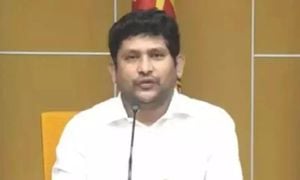Tetiana Prudnykova remembers running between the hospital and her home in Kyiv with her son Mikhailo when the air raid sirens began. Mikhailo, who has cerebral palsy, was suffering from a fever caused by Covid. With three years passed since they fled their home during the Russian invasion, they have found solace thousands of miles away, settling in Glasgow's Langside, UK.
Mikhailo, affectionately nicknamed Misha, is among the weekend pupils at St Mary's Ukrainian School, where children displaced by the conflict can receive education in their native language. The school's Saturday classes allow youngsters to maintain a cultural connection with their homeland. "When the war started, Misha was in the first year of school, and it's very hard to learn online," Tetiana noted. "That's why we are very glad we have a Ukrainian school here." After school, pupils can participate in a children's choir, singing songs in Ukrainian.
Nataliya Lyalyuk, manager of St Mary's, emphasized the importance of continuing ties to their homeland: "We help them to speak Ukrainian. We have classes on Ukrainian history, language, literature, geography, and music. The aim is to speak, dream, and learn Ukrainian, and celebrate its heritage." Most children at St Mary's hail from Ukraine's south and east, regions severely impacted by the war. Despite having to adapt to English, many are fluent in Ukrainian as well. Liubomyra Malanii, a teacher at the school, acknowledged this challenge: "It's very important for Ukrainian children. It's very difficult because every day, children are speaking English much more and not using Ukrainian enough."
Tetiana and her family initially fled to Western Ukraine to be closer to medical facilities for Mikhailo. Eventually, they moved to Poland, and when the conflict aggravated, they were left searching for long-term refuge, arriving in Scotland under the government’s super sponsor visa scheme. Among the newer arrivals, over 12 million Ukrainians have fled the war, with approximately 28,000 now residing in Scotland.
After enduring months of turmoil, their family transitioned from living in hotels to settling down in a ground-floor flat suitable for Mikhailo's needs. The school has become a highlight for Mikhailo and many others, especially as anxieties about the situation back home increase. While Ukrainian nationals may apply for visa extensions to remain the UK for 18 months, this does not guarantee permanent settlement.
Recent talks about potential peace deals have intensified Tetiana's concerns. "Trump says he can stop the war, but I don’t believe Putin. If I go back and he starts the war again, what should I do?" she pondered. For families like hers, the prospect of returning home remains fraught with uncertainty.
Another facet of support for Ukrainians is evident at the Reading Ukrainian Community Centre, where books offer comfort and connection to home. Its library, stocked with Ukrainian literature and opened this June, is sponsored by the Swiss charity Reading Studios. This initiative has also inspired similar facilities across Europe and two others within the UK.
Iryna Bakaliar, the volunteer manager of the Reading library, remarked on the unexpected loss of everyday items like books when fleeing: "Nobody plans to be displaced. You don't expect these things in your life. When it happens, you're so shocked, you grab a bag and don't really have space for books. You forget how much comfort books actually provide - until you don’t have them." Iryna recalled the emotional moment when a reader from Kharkiv came across a book printed there—"It smelled like home," she described. Tears were shed as the reality of their displacement hit home.
Mariia Kondratiuk, also based in Reading, expressed the significance of the library for herself and her fellow compatriots. "I think this library is amazing. It means so much to me. When I was growing up, my local library was one of my favorite places back home." She used Yuri Vynnychuk's novel, Tango of Death, as a source of comfort during her stay away from home, noting how it helped transport her back to Lviv when she felt homesick.
Oksana, another patron, has found joy reading with her daughter, Diana. "When I'm reading, she likes to listen and asks questions about the stories. It makes me feel like I'm at home, with no war. We have friends nearby, and we can live like we used to." This unity, even amid struggle, is something cherished by many Ukrainian refugees.



